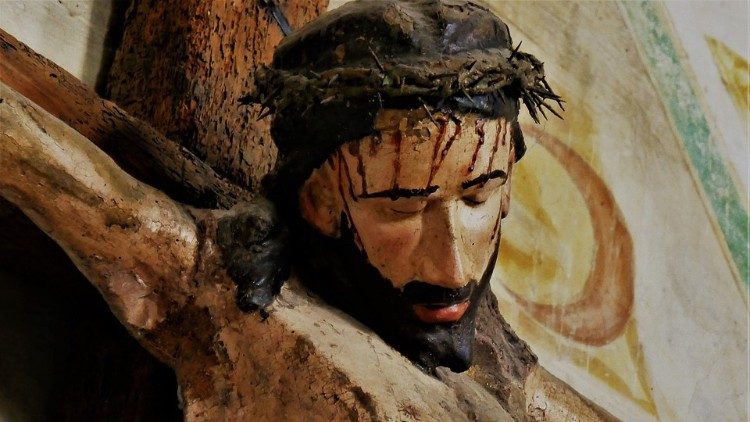Reflection by Monsignor Enrique Díaz: The two will become one flesh
XXVII Ordinary Sunday

Monsignor Enrique Díaz Díaz shares with the readers of Exaudi his reflection on the Gospel of this Sunday, October 6, 2024, entitled: “The two will become one flesh.”
***
Genesis 2, 18-24: “The two will become one flesh”
Psalm 127: “Blessed is he who fears the Lord”
Hebrews 2, 8-11: “The sanctifier and those who are sanctified are of the same condition”
Saint Mark 10, 2-16: “What God has joined together, let no man separate”
Does marriage make sense today? In current global changes, large sectors continue to recognize the value of the family in the world as a fundamental element for a healthier and more vigorous society, an unavoidable creator of values in the education of children. However, we must recognize the serious crisis that the family and marriage are going through. Phenomena such as poverty, individualism, the pace of modern life, stress, jobs and transfers; an ambiguous conception of freedom, the difficulty in acquiring solid commitments, and an implacable legal and social struggle to implement gender ideology, have caused the family to be seriously damaged. Someone already told me: “Nowadays nobody wants to get married.”
The question of the Pharisees does not expect an answer, but rather seeks a reason for accusation; they want to test Jesus, and what better than to put it in a burning question, both at that time and now: divorce. It was based on a prescription from Deuteronomy (24, 1-4) that sought to protect women and guarantee them a certain freedom, but that, over time, in a sexist society, had become a weapon for men and divorce was granted to them very easily and denigrated women. The reasons for dismissing them were ridiculous: if the woman let the food burn, if the man had found another more attractive woman or even stronger reasons such as the case of the woman’s adultery. Today we would add many more reasons for rushed divorces that are cooked up in a few days, that leave men and women in distressing solitude and that cause great confusion in the children. The discussions focus on what would be better: an environment of aggression, lack of respect, mutual disinterest, or a painful separation, in which each one leaves on their own.
Jesus’ response does not intend to save marriage by resorting to legal technicalities or condemning those who find themselves in such difficult situations. Jesus once again proposes marriage as it was presented at the dawn of creation. The divine plan for marriage is a plan of love, of life, of harmony, of light and of unity. The encounter between man and woman is the face to face of two subjects of equal dignity, each one “insufficient” but who is fully completed in the gift of self, in the reciprocal donation for the joy of the other. The love that he gives to the person is indissoluble, but not in the trap of an external obligation, but in a kind of internal necessity. Unfortunately, instead of Adam’s joyful cry: “This is now, bone of my bones and flesh of my flesh,” as an initial song of openness and encounter, Jesus is now presented with the demand for “a divorce certificate,” as if this could heal the wounded heart of the being who no longer loves himself. The spontaneous poetry of the origins is extinguished to give way to legal norms; gratuitousness is transformed into calculation and selfishness.
In the first reading, Genesis made the statement: “It is not good for man to be alone,” and presented God as concerned about making him a helper like himself. He had offered him the wonders of his garden and all the grandeur of the universe, but man needed someone like himself. Man in a state of separation cannot enjoy his own happiness. When Christ gives the answer to the Pharisees, he intends to rediscover the lost unity and harmony; man must not separate himself from the divine project. He does not seek legal reasons, but rather to put it in a deeper perspective. It is not a question of casuistry, but of reasons of the heart: “Because of the hardness of the heart…” The hardness of the heart is what does not allow us to open up to our partner, the hardness of the heart is what forces the other to accommodate to our whims, the hardness of the heart is what leads to making calculations and personal advantages. And Jesus himself is given as an example (second reading) and offers a solution to this problem: the Passion of Christ, which is the path to reach glory, reminds us of the price of fidelity. When we speak of love, in the Christian style, we cannot get out of our minds the image of the Crucified One who gave himself completely.
On this path of true love, we still have a long way to go. Marriage is reached without sufficient preparation and without the commitment to total surrender. There are many conditions that make it easy for people to abandon their common dreams because their personal ambitions have not been fulfilled. There are many who give up before having fought. But as a Church we also need much more understanding and support for those who, for one reason or another, have suffered a heartbreaking and painful separation and who cannot find a way forward. Jesus has a word of love and encouragement for them and never leaves them alone. Jesus accompanies them on their path. We will have to diligently and courageously seek ways that make this loneliness less difficult.
Today, like every Sunday, we are left with many questions in our hearts: What does Jesus say when he looks at our families, couples and the way they relate to each other? What words would he say to us about divorce? Are there no de facto divorces, even if they continue to live under the same roof? What attitude would Jesus take with divorced or separated people? How should they live their loneliness? How can we accompany them?
Good Father, you have left an authentic image of your own love in the union of man and woman, grant that, overcoming the hardness of our hearts, we may understand that we will only attain true fidelity by following the example of your Son Jesus who out of love gave himself up to death. Amen.
Related

THE WAY OF THE CROSS: Accompanying Jesus on the way to the Cross
Luis Herrera Campo
31 March, 2025
5 min

Mother Carmen Rendiles, the first Venezuelan saint proclaimed by the Universal Catholic Church
Exaudi Staff
31 March, 2025
3 min

The International Academy of Catholic Leaders: Renewal and Commitment to its Mission
Exaudi Staff
30 March, 2025
4 min

Reflection by Bishop Enrique Díaz: The Heart of the Father
Enrique Díaz
30 March, 2025
5 min
 (EN)
(EN)
 (ES)
(ES)
 (IT)
(IT)

